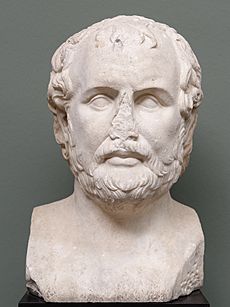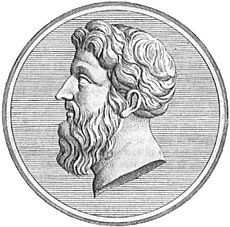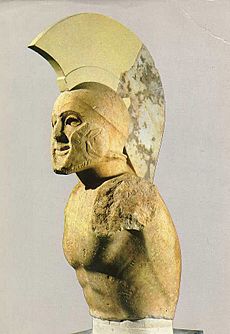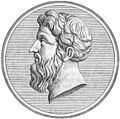Laconic phrase facts for kids
A laconic phrase is a very short, clear, and often witty statement. It's like saying a lot with just a few words. This term comes from Laconia, a region in ancient Greece that included the famous city of Sparta. The people of Sparta were known for being very direct and not using many words, and their remarks were often quite clever.
Contents
Why People Use Laconic Phrases

People use laconic phrases for several reasons. Sometimes, it's for efficiency, especially in situations like military training where quick, clear messages are important. Other times, it's to make a strong point or to show off a clever sense of humor. Some thinkers, like the Stoics, believed in keeping things simple, so they used short, direct language. Laconic phrases can also be used to put down someone who is being too boastful or talking too much.
A famous story involves Philip II of Macedon, a powerful king. After taking over many cities in southern Greece, he turned his attention to Sparta. He sent a threatening message asking if he should come as a friend or an enemy. The Spartans simply replied, "Neither."
Philip got annoyed and sent another message:
If I invade Laconia, I shall turn you out.
The Spartan leaders (called ephors) replied with just one word:
If.
Philip did invade Laconia, causing a lot of damage, but the Spartans' short, brave reply became famous.
Laconic Humor: The Spartan Way of Jokes
The Spartans were especially known for their dry, understated humor. This type of wit is now called "laconic humor." It was quite different from the "Attic salt" or "Attic wit" of their main rival, Athens, which was more refined and delicate.
Over time, other groups have also become known for their laconic humor. This includes Icelanders in their old stories called sagas. In English-speaking countries, you might find this type of humor among Australians (think of Australian humor), American cowboys, people from New England, and those from Northern England.
The History of Spartan Speech
Spartans didn't focus as much on education, arts, or literature as other ancient Greeks. Some people think this is why their speech was so blunt and to the point. However, the philosopher Socrates, in a dialogue by Plato called Protagoras, suggested that the Spartans' short way of speaking wasn't just because they lacked education. He said they actually hid their wisdom and pretended to be simple. Socrates believed this made them seem superior because of their fighting skills. He said if you talked to an ordinary Spartan, they might seem stupid at first. But then, "like an expert marksman, he shoots in some brief remark that proves you to be only a child."
Socrates admired Spartan laws, and many other Athenians did too. But modern experts aren't sure how serious Socrates was about Spartans secretly loving philosophy. Still, two Spartans, Myson of Chenae and Chilon of Sparta, are traditionally counted among the Seven Sages of Greece. Both were famous for many short, wise sayings.
In general, Spartans were expected to use few words. They looked down on fancy speeches and believed in getting straight to the point. Talking too much was seen as silly and not fitting for serious Spartan warriors. There's a story that a young Spartan might have his thumb bitten as punishment if he gave too long an answer to a teacher's question!
Famous Spartan Laconic Examples
Wise Sayings from Spartan Leaders
- A clever saying is attributed to Lycurgus, the legendary lawgiver of Sparta. When someone suggested setting up a democracy there, he replied, "Begin with your own family."
- Another time, Lycurgus was asked why Sparta's sacrifices to the gods were not very grand. He answered, "So that we may always have something to offer."
- When asked how Spartans could best stop their homeland from being invaded, Lycurgus advised, "By remaining poor, and each man not desiring to possess more than his fellow."
- When asked if it would be smart to build a defensive wall around the city, Lycurgus said, "A city is well-fortified which has a wall of men instead of brick." (Later, when another Spartan was shown an Asian city with impressive walls, he remarked, "Fine quarters for women!")
- A visitor asked Anaxandridas why Spartans let helots (enslaved people) farm their fields instead of doing it themselves. Anaxandridas explained, "It was by not taking care of the fields, but of ourselves, that we acquired those fields."
- King Demaratus was bothered by someone asking who the best Spartan was. He answered, "He that is least like you."
- When her husband Leonidas left for battle against the Persians at Thermopylae, Gorgo, Queen of Sparta asked what she should do. He told her: "Marry a good man and bear good children."
Battlefield Wit
- There are two famous examples from the Spartans during the Battle of Thermopylae, which you might have seen in movies like 300.
* First, a Persian soldier boasted that when the battle began, "our arrows will block out the sun!" The Spartans calmly replied: "then we will fight in the shade." * Second, a Persian commander demanded that the Spartans and their allies surrender and give up their weapons. The Spartans, ready for battle, responded: "Come and take them!"
- After a terrible sea battle at Cyzicus, the admiral Mindarus's first mate sent a very short distress signal to Sparta. The Athenians captured the message, and it was recorded by Xenophon in his Hellenica: "Ships gone; Mindarus dead; the men starving; at our wits' end what to do."
Images for kids
See also
 In Spanish: Laconismo para niños
In Spanish: Laconismo para niños
- Aphorism
- One-line joke
 | Stephanie Wilson |
 | Charles Bolden |
 | Ronald McNair |
 | Frederick D. Gregory |







